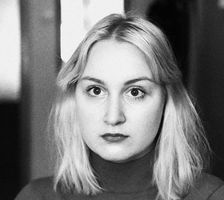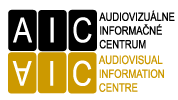Interview with Alica Bednáriková:
"Making best use of the means of fiction film"
 The director Alica Bednáriková got on the radar of foreign festivals rather early – with her student film Boredom (2020) about Greta, a compulsive liar whose manipulative behaviour sets off an absurd chain of events. The typically playful narration is also characteristic of her bachelor’s graduation film Liquid Bread (2021) which premieres at the 75th edition of the Festival de Cannes, in La Cinef selection.
The director Alica Bednáriková got on the radar of foreign festivals rather early – with her student film Boredom (2020) about Greta, a compulsive liar whose manipulative behaviour sets off an absurd chain of events. The typically playful narration is also characteristic of her bachelor’s graduation film Liquid Bread (2021) which premieres at the 75th edition of the Festival de Cannes, in La Cinef selection.
Not many Slovak films can pride themselves on being presented at Cannes. How do you feel about it?
It is a great honour for me and the whole crew to attend the festival. I believe the amount of hard work we did on the film had something to do with it. Personally, I still can’t believe it, I think it'll only dawn on me once we get there. For now, I am very happy about it and I hope everything goes smoothly at the projection.
Not unlike Boredom, your previous film, Liquid Bread is a playful take on film narration. Zoja, the protagonist, visits her family in Southern Slovakia and presents her family members to us one by one. She’s recording her commentary on a voice recorder and only at the end, we learn that the purpose of the visit was to find inspiration for her upcoming film. Could it be so that we have actually been following you, seeking inspiration for Liquid Bread this whole time?
I always strive to put a little bit of truth into my films, to have them reflect something we know, to document the lives and feelings of our generation. I base them on situations I’ve seen or experienced and create a story around them. I wanted Liquid Bread to function as a memory – I’d swear some segments happened exactly that way, verbatim. The rest was enhanced by my memory.
In your film, you bring three generations together under the same roof. The differences start to emerge almost immediately. Nearly everyone knows these situations, why did they speak to you?
I find it interesting to take a closer look at how generations influence one another. Directing the sequences of the late 80’s/early 90’s was very entertaining, especially because of the costumes and make up. We could really have fun with it, me and make-up artist Danka Táborská plus costume designer Evka Miklisová. Also, many of the costumes belonged to my parents or my friends’ parents, which created a certain familiar authenticity. To me, the first generation is the strongest one. The grandparents watch their tiny innocent actions snowball into the consequences, but they are mere observers, as if it didn’t concern them anymore. They keep on swimming, without looking back.
Alcohol plays a vital role in the microcosm of your film.
Yes, and so does the presence of God and memories of the past. Alcohol is a means of forgetting, or coming to terms with what happened. Although alcoholism is often associated with Slovakia in a negative way or used as an attribute of the “typical Slovak nature”, that's not its purpose in my film. It’s an authentic element of the story.
Ironically, the absurd situations also feel authentic.
I like absurdity in film, theatre, or literature. I don't think I’m creating it intentionally, it just sort of naturally happens to appear in the script. I like it when people don’t take themselves too seriously, and I’m searching for such characters in my films, too. Or the ones who take themselves a little too seriously, too. My co-scriptwriter Diana Dzurillová and I knew what kind of humour we both like and what we find funny or absurd in a film. We discussed it a lot and gradually managed to identify what could work in a script. Or at least we tried to.
Apart from the majority of contemporary student films, your works employ numerous elements you’re breaking the fourth wall with, keeping viewers on their toes. I’ll mention the commentary of the protagonist contradicting what we see, or wigs and costumes that don’t look believable and don’t deceive viewers by trying to pass off everything they see as real. What is your approach to selecting stylistic means?
I see Liquid Bread as an anecdote, which allows me to use these formal eccentricities. If a character has boyfriends, she has to be passionately making out with them all in front of her house. If characters drink, they have to drink all together in one room with musical accompaniment. If someone gets injured, they have to have a cast, crutches, and be limping… I’m simply trying to make best use of the means of fiction film. I want the memory I’m exploring in the film to deceive me. It should be interesting, and at the same time, question my memory – to what extent is it really authentic? Because film is fiction and no matter how hard we try to create an authentic portrait of reality, we’ll never succeed in it fully, we can only come close to it. Personally, I find it a lot more interesting to admit that fiction is fiction, search for the fragments of truth somewhere in between and find the “life” we know (in dialogues, reactions, emotions, in acting).
Liquid Bread is your bachelor’s graduation film. What other topics or what direction do you plan on exploring in your works?
I feel as if I’m still recovering from making my graduation film. I’m trying to gather some inspiration and talk to friends about topics I am curious about as a filmmaker, for example maturing and nostalgia – and how quickly the present becomes nostalgia. Can we now look at the year 2013 and summarise its characteristic attributes? It seems to me that today, we grow out of things a lot sooner, we see things in perspective, observe them from a distance. Present-day stories also intrigue me. I’d like to see more of what I know in films – more themes and allusions we normally use in conversation. I want to hear the Slovak language spoken the way we really use it. I want to see complex female characters, and above all, female friendships.
→ Liquid Bread will be screened on 25 May at 2:30 PM at Buñuel Theatre.
Text: Lea Pagáčová
Source: Film.sk Cannes Edition 2022
|
||
| DocID: 25503 Chenged by: Lea Pagáčová Date: 27.01.2022 11:05 |
published: 04.05.2022
updated: 06.05.2022




